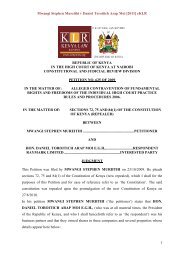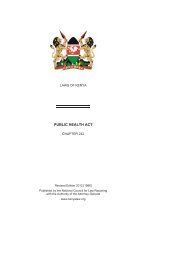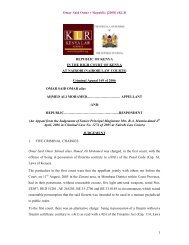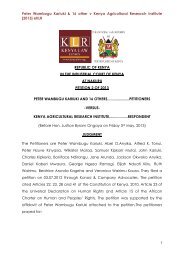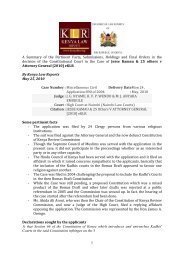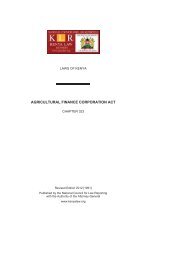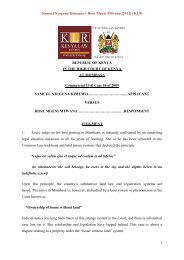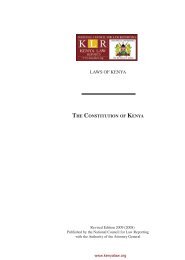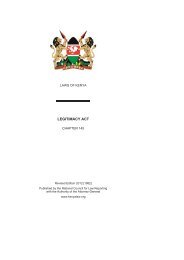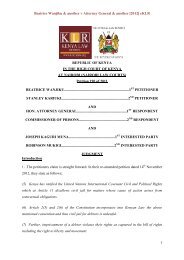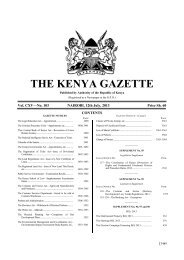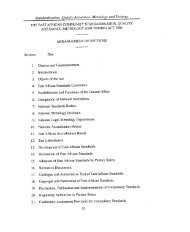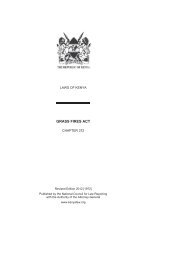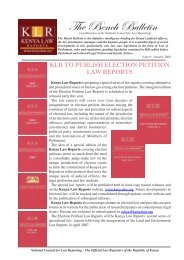Bench Bulletin - Issue 12 - Kenya Law Reports
Bench Bulletin - Issue 12 - Kenya Law Reports
Bench Bulletin - Issue 12 - Kenya Law Reports
You also want an ePaper? Increase the reach of your titles
YUMPU automatically turns print PDFs into web optimized ePapers that Google loves.
KENYA LAW REPORTS<br />
BENCH BULLETIN<br />
FROM THE COURTS — COURT OF APPEAL<br />
Manufacturer’s Duty of Care to Consumers<br />
<strong>Kenya</strong> Breweries Ltd v Godfrey Odoyo<br />
Court of Appeal at Nairobi<br />
Civil Appeal <strong>12</strong>7 of 2007<br />
Bosire, Onyango Otieno & Nyamu JJ.A<br />
April 16, 2010<br />
By Esther Nyaiyaki Onchana<br />
Case History<br />
Appeal from the judgment of the High Court of <strong>Kenya</strong> at Nairobi (Visram, J.) dated 8th August, 2005 in H.C.C.A. NO.<br />
480 OF 2002<br />
The Hon. Mr. Justice<br />
W. Onyango Otieno<br />
Tort – negligence – damages for injuries suffered due to consumption of contaminated beer –<br />
appeal against liability and damages awarded in the consumer – whether the two lower courts<br />
were wrong in holding beer manufacturer liable – the rule in Donoghue v Stevenson – whether<br />
the principles enunciated in the rule were proved – whether duty of care by the appellant to<br />
the respondent had been established – whether negligence by the appellant if any resulted in<br />
injury to the respondent<br />
Tort – negligence – liability – where the bottle that was analyzed was not the one consumed<br />
by the respondent – appellant alleging that there was no nexus between the contents of the<br />
bottle that was examined and the injury suffered by the respondent – whether report by <strong>Kenya</strong><br />
Bureau of Standards was improperly obtained – effect of -<br />
The respondent sought judgement against the appellant in the Chief Magistrate’s Court for<br />
general damages and special damages. He sought this on the grounds that the respondent,<br />
being a beer manufacturer, which manufactured among other brands of beer, the beer brand<br />
of Tusker Malt Larger, (300 ml) on June 23, 2000 put on sale three Tusker Malt Lager bottles which the respondent<br />
bought and partly consumed.<br />
He alleged that the beers did not comply with specifications on foreign matter and clarity and were therefore unfit for<br />
human consumption causing him to suffer severe injuries and special loss. After full hearing, the trial court found the<br />
appellant liable and awarded to the respondent general damages in the sum of Ksh.70,000 for pain and suffering and<br />
a further Ksh.21,990 for special damages in respect of hospital fees paid for treatment.<br />
On appeal, the superior court upheld the trial court’s decision on liability and on<br />
special damages but set aside the award of for general damages and substituted it with<br />
an award for Kshs. 20,000. The appellant filed a second and last appeal at the Court<br />
of Appeal premised on the grounds that the superior court had erred in upholding<br />
the trial court’s finding on liability, in particular that the appellant’s injuries, if any,<br />
were caused by beer manufactured by the appellant. In addition the appellant faulted<br />
the superior court’s finding that the appellant was negligent and that such negligence<br />
resulted in injury to the respondent and that the court failed to follow the principles<br />
laid down in decided cases relating to negligence.<br />
The appellant’s advocate submitted that because the bottle which was submitted for<br />
analysis was not the same bottle consumed by the respondent, there was no evidence<br />
it connected to the respondent. He contended that the principles enunciated in the<br />
well known case of Donoghue v. Stevenson, where injury arose from drinking the<br />
content of a manufactured bottle that contained a snail were, first that there had to<br />
be a duty of care to the respondent by the appellant, secondly, breach of that duty<br />
had to be established, and thirdly that it had to be proved that respondent suffered as a result of the breach of that<br />
duty. It was further submitted, that a report by <strong>Kenya</strong> Bureau of Standards was improperly obtained because the law<br />
required such a test to be carried out only on the request of the relevant the Minister. He argues that in the instant case<br />
the test was requested done at behest of an advocate.<br />
<strong>Issue</strong> <strong>12</strong>: April-June 2010<br />
53



